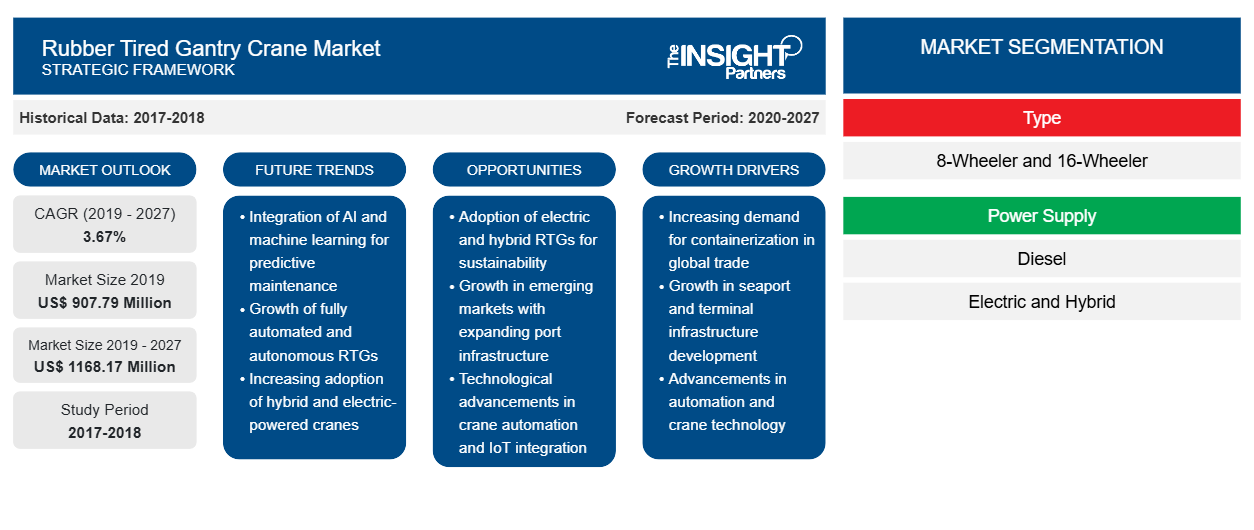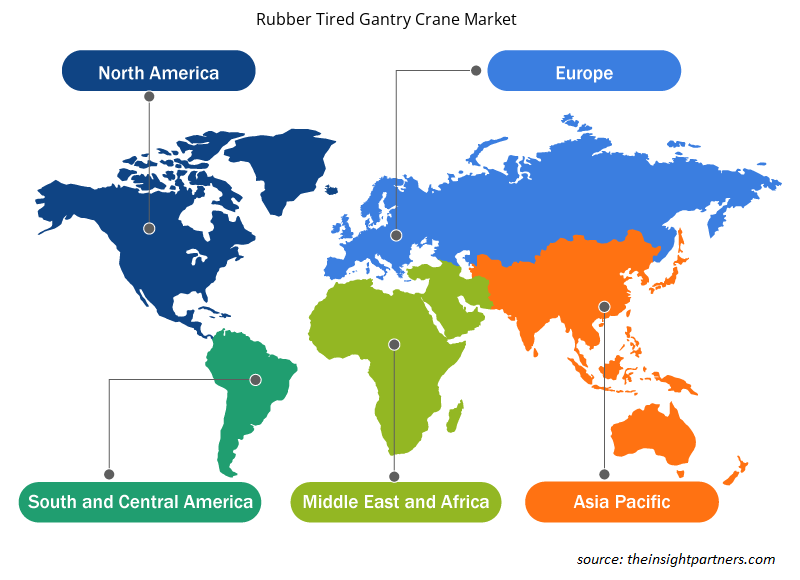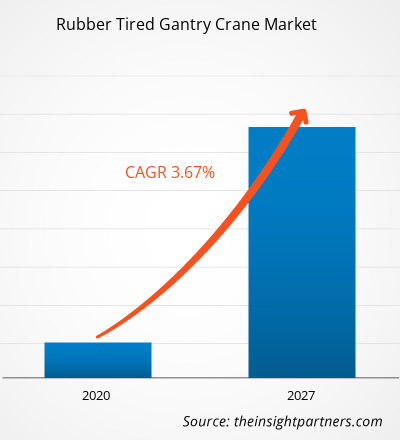The rubber tired gantry crane market was valued at USD 907.79 million in 2019 and is projected to reach USD 1168.17 million by 2027; it is expected to grow at a CAGR of 3.67% from 2020 to 2027.
In the past, developing countries were providers of raw materials; however, the layout of trade has given a new role to the developing countries across the globe, owing to which the rubber tired gantry crane market is predicted to witness a significant growth rate during the forecast period. The market growth is majorly attributed to the rise in the demand for seaborne trading, as developing countries, including China, are now emerging as important importers and exporters of goods by sea, with Asia being the biggest trading region.
Additionally, the rubber tired gantry crane market is driven by favorable government initiatives for the development of ports. A port becomes a wheel of the economy if it runs capably. Nowadays, the purpose of a port is not only limited but has extended to a logistical platform. The productivity of a port is important in international trade as a seaport is the nerve of foreign trade of a country. Several government policies are undertaken, which will, in turn, drive the global rubber tire gantry crane market during the forecast period.
Europe led the rubber tired gantry crane market in 2019 and is expected to continue its dominance during the forecast period. Europe's ports have adopted electric RTGs for reducing pollution and greenhouse gas emissions. Government regulations in this region have enabled the adoption of electrical container handling equipment, such as carbon emission verification in maritime transportation. Europe accounts for a large volume of trade in products and assets, such as machinery, vehicles, aircraft, fuels, nonferrous metals, textiles, chemicals, clothing, and crude oils. Europe ranks first in trading owing to which the region leads the global market for rubber tired gantry cranes.
Customize This Report To Suit Your Requirement
You will get customization on any report - free of charge - including parts of this report, or country-level analysis, Excel Data pack, as well as avail great offers and discounts for start-ups & universities
Rubber Tired Gantry Crane Market: Strategic Insights

- Get Top Key Market Trends of this report.This FREE sample will include data analysis, ranging from market trends to estimates and forecasts.
You will get customization on any report - free of charge - including parts of this report, or country-level analysis, Excel Data pack, as well as avail great offers and discounts for start-ups & universities
Rubber Tired Gantry Crane Market: Strategic Insights

- Get Top Key Market Trends of this report.This FREE sample will include data analysis, ranging from market trends to estimates and forecasts.
Impact of COVID-19 Pandemic on Rubber Tired Gantry Crane Market
The COVID-19 crisis is affecting the industries worldwide and the global economy is anticipated to take a worst hit in 2020 as well as in 2021. The outbreak has created significant disruptions in primary industries such as consumer electronics, semiconductor, automotive, and IT infrastructure. All these industries are crucial for the growth of the global rubber tired gantry crane market as they are the major demand generation industries for rubber tired gantry cranes. The factory shutdowns, travel bans, trade bans, and border lockdowns have impacted both manufacturing and sales of various consumer electronic products and components. The global electronics and semiconductor industry is one of the major industries that are facing serious disruptions due to supply chain issues and manufacturing shutdowns.
Market Insights
Rising Focus Toward Green Technology
Market participants focus on green technology due to strict government regulations pertaining to pollution and emission limits across various regions. Also, the use of RTGs equipped with electric drives can be optimized to consume less power. The use of the battery hybrid technology on the cranes will focus to substantially reduce fuel consumption and harmful fossil fuel emissions. Approximately 10% of the diesel fuel emissions from cargo handling equipment at ports are emitted by RTG cranes; the implementation of more efficient RTGs directly lessens the environmental impact of crane operations. This technology is an answer for busy port operators worldwide who need to increase efficiencies while reducing emissions and the environmental impact of their operations, as well as provide additional benefits of reduced operating costs with less greenhouse gas emissions and lower noise levels at the terminal. Flywheel energy storage technology for rubber Tire gantry cranes or RTG that can either be retrofit to existing RTG cranes or included as part of a new build. Flywheels offer fuel and emission reductions by capturing braking energy produced when a container is lowered.
Type-Based Market Insights
Based on type, the global market for rubber-tired gantry cranes can be divided into two segments: 8-wheeler and 16-wheeler. There are two types for each model the 8W and 8WA for the 8-wheeler, and the 16W and 16WA for the 16-wheeler. The main differences between the two models are the design of the anti-sway system and the number of gantry wheels. The 16-tired RTG cranes require a larger travel area. They cannot, therefore, be used in tiny spaces. 8-tired RTG cranes are preferred for smaller spaces.
Power Supply-Based Market Insights
Based on power supply, the global market for rubber tired gantry cranes can be classified into three categories: diesel, electric, and hybrid. Implementation of strict emission standards to minimize global emissions and the development of more efficient electrified vehicles, as well as higher fuel prices, are likely to boost the demand for electric and hybrid RTG cranes across the globe. Electrical RTG cranes offer better performance and can move substantial loads. Because of this, the preference for tired gantry cranes with electric and hybrid rubber is expected to increase shortly.
Product development is among the most commonly adopted strategies by companies to expand their product portfolio. Anupam industries limited, electromech material handling systems (India) Pvt. ltd, Konecranes, Liebherr, and Kalmar are among the key players implementing strategies to enlarge the customer base and gain significant share in the rubber tired gantry crane market, which, in turn, permits them to maintain their brand name in the global market.
Rubber Tired Gantry Crane Market Regional Insights
The regional trends and factors influencing the Rubber Tired Gantry Crane Market throughout the forecast period have been thoroughly explained by the analysts at The Insight Partners. This section also discusses Rubber Tired Gantry Crane Market segments and geography across North America, Europe, Asia Pacific, Middle East and Africa, and South and Central America.

- Get the Regional Specific Data for Rubber Tired Gantry Crane Market
Rubber Tired Gantry Crane Market Report Scope
| Report Attribute | Details |
|---|---|
| Market size in 2019 | US$ 907.79 Million |
| Market Size by 2027 | US$ 1168.17 Million |
| Global CAGR (2019 - 2027) | 3.67% |
| Historical Data | 2017-2018 |
| Forecast period | 2020-2027 |
| Segments Covered |
By Type
|
| Regions and Countries Covered | North America
|
| Market leaders and key company profiles |
Rubber Tired Gantry Crane Market Players Density: Understanding Its Impact on Business Dynamics
The Rubber Tired Gantry Crane Market is growing rapidly, driven by increasing end-user demand due to factors such as evolving consumer preferences, technological advancements, and greater awareness of the product's benefits. As demand rises, businesses are expanding their offerings, innovating to meet consumer needs, and capitalizing on emerging trends, which further fuels market growth.
Market players density refers to the distribution of firms or companies operating within a particular market or industry. It indicates how many competitors (market players) are present in a given market space relative to its size or total market value.
Major Companies operating in the Rubber Tired Gantry Crane Market are:
- Anupam Industries Limited
- Electromech material handling systems (India) Pvt. Ltd
- Kalmar
- Konecranes
- Liebherr
Disclaimer: The companies listed above are not ranked in any particular order.

- Get the Rubber Tired Gantry Crane Market top key players overview
Rubber Tired Gantry Crane Market Segmentation:
By Type
- 8-Wheeler
- 16-Wheeler
By Power Supply
- Diesel
- Electric
- Hybrid
Company Profiles
- Anupam Industries Limited
- ELECTROMECH MATERIAL HANDLING SYSTEMS (INDIA) PVT. LTD
- Kalmar
- Konecranes
- Liebherr
- Mi-Jack Products.
- REVA INDUSTRIES LTD
- Shanghai Zhenhua Heavy Industries CO., Ltd. (ZPMC)
- TNT Crane & Rigging
- Sany Group
Frequently Asked Questions
Which Power supply led the rubber tired gantry cranes market?
Being mobile, RTGs are often powered by a 100 to 600 kW diesel generator (genset) system. Because of the lack of an electrical grid to dump energy when containers are lowered, they often have large resistor packs to dissipate the energy of a container that is lowering or decelerating quickly. Diesel-powered RTGs are notorious ports polluters, as they burn up to 10 gallons of diesel fuel per hour each. Due to their use of more fuel, volatility in fuel costs, and generation of gas emissions such as carbon dioxide and nitrogen oxides, Diesel rubber tired gantry cranes are usually environmentally and economically inefficient. Converting from diesel to electrified RTG cranes is one way to reduce carbon gas emissions and operating costs. The conversion of rubber tired gantry cranes from diesel to electric power, or switchable diesel / electric power, is an emerging trend in container ports around the world and one that has led Conductix-Wampfler to extensive field tests. While the RTG operates in a row of containers, it can only run on electric power, and the diesel engine can be switched off.
Which region led the rubber tired gantry cranes market in 2019?
The Europe region led the rubber tired gantry cranes market in 2019. The major contributors to the rubber tired gantry cranes market in Europe are Germany, France, the UK, Russia, and Italy, among others. Europe's ports have adopted electric RTGs for reducing pollution and greenhouse gas emissions. Government regulations in this region have enabled the adoption of electrical container handling equipment, such as carbon emission verification in maritime transportation. Also, financial transparency regarding port investments has enabled port authorities to invest strategically in port infrastructure. European nations rank among the leading importers and exporters of commodities and goods. Europe accounts for a large volume of trade in products and assets, such as machinery, vehicles, aircraft, fuels, nonferrous metals, textiles, chemicals, clothing, and crude oils. Europe ranks first in trading, owing to which the region leads the global market for rubber tired gantry cranes.
Which factor is driving the rubber tired gantry cranes market?
The layout of trade has given a new role in developing countries across the globe. While in the past, developing countries were providers of raw materials. Nowadays, developing countries, including China, are emerging as important importers and exporters of goods by sea. This has led to an increase in the demand for seaborne trading. Rise in the growth of seaborne trade has been rising over the years. Asia region was, till now by far the biggest trading region. In 2018, 4.5 Bn tons of goods were loaded, and 6.7 Bn tons unloaded in Asian seaports. The other continents were noted less than half of these amounts. Over the years, developing economies still accounted for the largest share of global seaborne trade, both in terms of exports (goods loaded) and imports (goods unloaded). However, an important rise in the seaborne trading is assisting the rubber Tire gantry crane market across the globe. Moreover, an increase in in-country transportation of commodities and goods via trains is rising the global rubber Tire gantry crane market.
- Historical Analysis (2 Years), Base Year, Forecast (7 Years) with CAGR
- PEST and SWOT Analysis
- Market Size Value / Volume - Global, Regional, Country
- Industry and Competitive Landscape
- Excel Dataset
- Boat Sails Market
- Heavy Commercial Vehicle Air Brake Systems Market
- Heavy Commercial Vehicle Clutch Market
- Electric Vehicle Heat Pump Systems Market
- Event Logistics Market
- Industrial Vehicles Market
- Motorsport Transmission Market
- Automotive Telematics Market
- Third Party Logistics Market
- Low Speed Electric Vehicle Market
Testimonials
Reason to Buy
- Informed Decision-Making
- Understanding Market Dynamics
- Competitive Analysis
- Identifying Emerging Markets
- Customer Insights
- Market Forecasts
- Risk Mitigation
- Boosting Operational Efficiency
- Strategic Planning
- Investment Justification
- Tracking Industry Innovations
- Aligning with Regulatory Trends
Yes! We provide a free sample of the report, which includes Report Scope (Table of Contents), report structure, and selected insights to help you assess the value of the full report. Please click on the "Download Sample" button or contact us to receive your copy.
Absolutely — analyst assistance is part of the package. You can connect with our analyst post-purchase to clarify report insights, methodology or discuss how the findings apply to your business needs.
Once your order is successfully placed, you will receive a confirmation email along with your invoice.
• For published reports: You’ll receive access to the report within 4–6 working hours via a secured email sent to your email.
• For upcoming reports: Your order will be recorded as a pre-booking. Our team will share the estimated release date and keep you informed of any updates. As soon as the report is published, it will be delivered to your registered email.
We offer customization options to align the report with your specific objectives. Whether you need deeper insights into a particular region, industry segment, competitor analysis, or data cut, our research team can tailor the report accordingly. Please share your requirements with us, and we’ll be happy to provide a customized proposal or scope.
The report is available in either PDF format or as an Excel dataset, depending on the license you choose.
The PDF version provides the full analysis and visuals in a ready-to-read format. The Excel dataset includes all underlying data tables for easy manipulation and further analysis.
Please review the license options at checkout or contact us to confirm which formats are included with your purchase.
Our payment process is fully secure and PCI-DSS compliant.
We use trusted and encrypted payment gateways to ensure that all transactions are protected with industry-standard SSL encryption. Your payment details are never stored on our servers and are handled securely by certified third-party processors.
You can make your purchase with confidence, knowing your personal and financial information is safe with us.
Yes, we do offer special pricing for bulk purchases.
If you're interested in purchasing multiple reports, we’re happy to provide a customized bundle offer or volume-based discount tailored to your needs. Please contact our sales team with the list of reports you’re considering, and we’ll share a personalized quote.
Yes, absolutely.
Our team is available to help you make an informed decision. Whether you have questions about the report’s scope, methodology, customization options, or which license suits you best, we’re here to assist. Please reach out to us at sales@theinsightpartners.com, and one of our representatives will get in touch promptly.
Yes, a billing invoice will be automatically generated and sent to your registered email upon successful completion of your purchase.
If you need the invoice in a specific format or require additional details (such as company name, GST, or VAT information), feel free to contact us, and we’ll be happy to assist.
Yes, certainly.
If you encounter any difficulties accessing or receiving your report, our support team is ready to assist you. Simply reach out to us via email or live chat with your order information, and we’ll ensure the issue is resolved quickly so you can access your report without interruption.















The List of Companies - Rubber Tired Gantry Cranes Market
- Anupam Industries Limited
- Electromech material handling systems (India) Pvt. Ltd
- Kalmar
- Konecranes
- Liebherr
- Mi-Jack Products
- Reva Industries Ltd
- Shanghai Zhenhua Heavy Industries CO., Ltd
- TNT Crane & Rigging
- Sany Group






 Get Free Sample For
Get Free Sample For